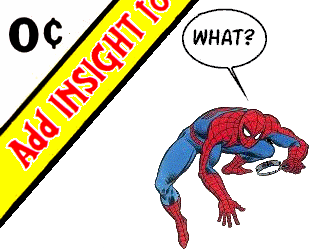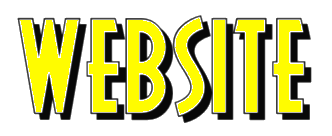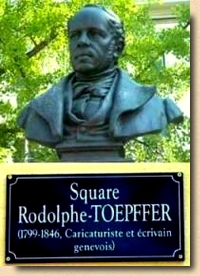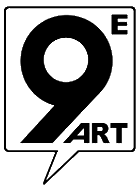| Consider, for instance, Roy
Thomas. Well known to comic book aficionados as fan,
writer and editor par excellence who worked for
both Marvel and DC, he is also recorded as having
remarked that "I love comics, but I always
considered them, even now, a lower form of
literature". It
may be that what Toepffer and Thomas - and many others
too - are trying to say is that comics, quintessentially,
have a fairly down to earth attitude with regard to their
own posture and what they aim to achieve. And perhaps the
ambivalence surrounding comics can also be an indication
of the fact that there are many different ways of looking
at comics.
|
| I
discovered this somewhat by chance myself when I
picked up a copy of Ronin Ro's 2005 book Tales
to Astonish - Jack Kirby, Stan Lee, and
the American Comic Book Revolution in early
2007. At first glance it seemed very odd to me
that a book dealing with comics contained not a
single illustration, but the price was reduced to
such an extent that I bought it. As it turned
out, the book was fascinating to read and hard to
put down. In its pages I found all kinds of
stories around and behind the comics I had read
thirty years ago, and after re-reading some of
those 1970s and 1960s Marvel comics (readily
available in the Marvel Masterworks
series) I discovered that those comics did indeed
hold points of interest which simply weren't
accessible to a twelve-year old kid in the
mid-1970s. Of course, it's still not
Shakespeare (although it is quite possible that
Shakespeare, had he had the chance, might well
have enjoyed comic books). But, with an
academically trained way of thinking, I came to
the conclusion that there's no good reason to say
that a similarly serious approach used to reflect
on Shakespeare could not be applied to the
subject of comic books - and so I gradually
recharted my own map of comics. The pages on this
website are, in many ways, just a side effect of
this.
|
|
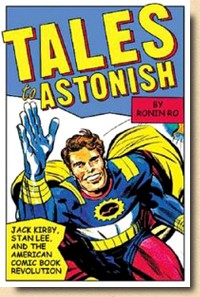 |
|
| Now I hasten to add that by
"academic" I refer to the methodology more than
anything else. To me at least it would seem slightly
foolish to approach a subject that doesn't take itself
too seriously in an over-serious way. Basically, it's
about what Stan Lee once said: Just because
something's for fun doesn't mean we have to blanket our
brains while reading it. For example, there are quite a few
interesting publications dealing with comics - both books
and online articles - that leave the reader guessing
about whether an author is making an original statement
or relaying information from someone else, and if so,
where this quoted information comes from. The book which
got me started, Tales to Astonish, struck
me as being especially bad in this respect. Regardless of
whether something is attributed to Jack Kirby or
supposedly quoting Stan Lee, there is no indication as to
where the author got this information from.
Okay, why should this matter.
Well, it's a question of how you approach things. Take
this page, for example. If you've gotten as far as this
paragraph (for which I applaud you), you have already
been forced to accept fairly large chunks of information
as fact, just like that. Did Goethe really praise the
first modern form of comics, or was I just making things
up because it sounds like a good story and fits my line
of thought so well? And if Goethe did indeed say
something about Toepffer's work, how can you be sure my
German is up to understanding it correctly? And did Roy
Thomas really say that about comics? When and
where? Could it be that the quote is taken out of
context? After all, someone could take this page and
quote me as saying that comics are "just a shallow
form of entertainment for readers with little or no
intellect and sociability at all". Did I say that?
Yes, I did, but if you check back on the third paragraph
of this page, you will see that I phrased it as a
question, not as my own point of view. But how could you
know if you can't go back to the source where a given
information is said to come from? This is where I find
that a consciously more precise (scholarly if you will)
approach is more than appropriate. Books on comics, their
creators, and publishers, have improved greatly in this
department over the past 15+ years, but websites have, in
general, still quite a bit of room for improvement.
|
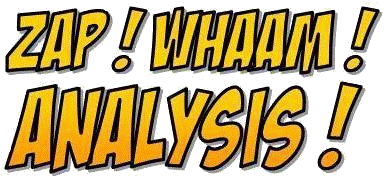 |
|
And
this is why, on most pages on this site,
you will find source indications, notes,
and bibliographies stating clearly where
an information used in the text is taken
from. The rest is, of course, just my
personal opinion and interpretation, and
should be taken just as that - although,
with all due modesty, it is at least an
informed one.
Goethe's enthusiastic reaction
is recorded by Joh. Peter Eckermann in
his Gespräche mit Goethe
[Conversations with Goethe] in an
entry dated 4 January 1831 as well as in a
letter from Frederic Soret to Toepffer in
Rodolphe Toepffer, Correspondance
complete vol. II (413-414/Letter
355), published by Droz in Geneva (2004).
The remark by Roy Thomas comes from an
interview by Jon Cooke in Comic Book
Artist issue 13,
Son of Stan:
Roy's Years of Horror. And the Stan
Lee quote comes from his Soapbox column,
featured in the March 1970
Bullpen Bulletin.
|
|
|
Maybe by reading this far you have asked
yourself why I make no mention of the growing interest in
comic books which academia has displayed over the past
two decades, offering degrees in - broadly speaking -
comic book studies. Well, with an academic background in
an entirely different field, I am more than happy to
simply try to be a fan who looks at his subject of
interest in an informed and open way, trying to combine
the fun with some insight.
In
any case, thanks for looking.

|

